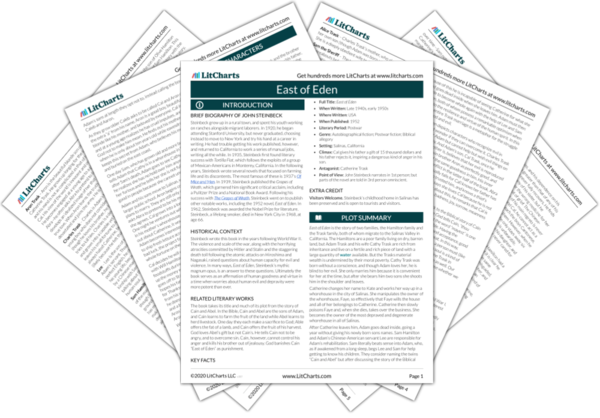One of the central differences between the two families in the novel (the Trasks and the Hamiltons) concerns wealth: The Trasks are rich and have good land, the Hamiltons are poor and their land is barren. This basic opposition is a gateway into a complicated and enduring discussion of the meaning of money, what constitutes “wealth,” and the role that work plays in a meaningful life.
Inheritance—the willing of money to someone who hasn’t necessarily earned it—repeatedly comes into play in this novel. Adam inherits a great deal of money from his father, and accepts it, though he knows it was probably stolen. He also inherits his brother Charles’ fortune, but half of this must go to Catherine even though she has left him, for they are still married. Catherine inherits the whorehouse and a small fortune from the previous madam Faye, whom she secretly poisoned for precisely that purpose. And Catherine finally wills her fortune to Aron, who dies in the war before he can accept it.
It is repeatedly said that Adam would be called lazy if he weren’t rich—but since he is rich he is above criticism. Still, working class characters in the novel—like Lee and Sam Hamilton—suspect that Adam was corrupted by his fortune. They perceive the rich to be fundamentally less happy than the poor, because they have no work they must do. There is also a distinction drawn between work for money and work for love: Sam loves to invent, but he loses money on his patents and greedy lawyers take all the profits. Tom also likes to invent without thinking about money, and so does Adam (his experiment with transporting refrigerated lettuce across the country is a spectacular failure, and loses him his fortune, but he doesn’t mind). Will Hamilton, who is intelligent in business but nowhere else, is scornful of such ventures. He believes money is the only thing worthy of pursuit. When Cal partners up with Will to make his father’s money back, he thinks the gift of money will be well received by his father—but Adam is disgusted with the gift because of how Cal’s success negatively affected others, and Cal ends up burning the money.
The novel repeatedly suggests that money holds only superficial value. It cannot buy love or happiness. The book’s discussion of money, wealth, and work amounts to a deeply anti-materialist warning about the danger of working and living only for money. Steinbeck asserts the inherent value of things like honest work, curiosity, and ingenuity—his happiest, wisest, and most fulfilled characters are those who place little stake in pure material wealth.
Money, Wealth, and the Value of Work ThemeTracker

Money, Wealth, and the Value of Work Quotes in East of Eden
They landed with no money, no equipment, no tools, no credit, and particularly with no knowledge of the new country and no technique for using it. I don’t know whether it was a divine stupidity or a great faith that let them do it. Surely such venture is nearly gone from the world
It seemed to Samuel that Adam might be pleasuring himself with sadness.
One day Samuel strained his back lifting a bale of hay, and it hurt his feelings more than his back, for he could not imagine a life in which Sam Hamilton was not privileged to lift a bale of hay.
“I send boys out…I sign my name and they go out. And some will die and some will lie helpless without arms and legs. Not one will come back untorn. Son, do you think I could take a profit on that?...I don’t want the money, Cal. And the lettuce—I don’t think I did that for a profit.”











